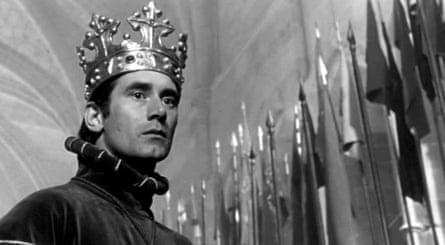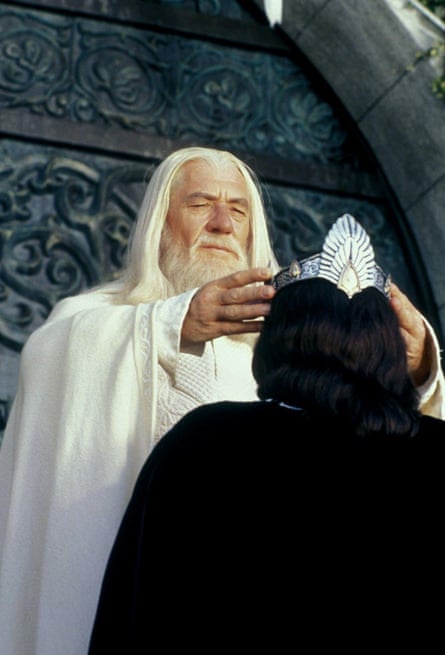On the morning of Saturday 6 May, King Charles III will waken to the realisation that this is the day which he has anticipated, or perhaps dreaded, all his life. Yet there is no reason to suppose he will be nervous. He is a veteran of royal occasions by the thousand and, specifically, his own two weddings which he experienced at the ages of 32 and then 56; perhaps he once imagined his coronation would happen sometime between these two. Now he is 74 and, if anything will cloud the experience for him, it might be the memories of his parents’ recent (and comparably momentous) funerals.
But how do we imagine he will feel about his role in this sumptuous ritual which is in its way a survival from Britain’s pre-Reformation Catholic past? And is there anything in the movies to help us? The most famous coronation scene in cinema comes to us via Shakespeare, in the form of Henry’s icy rejection of Falstaff on his coronation day in Orson Welles’s Chimes at Midnight, his concatenated mashup of Richard II, both parts of Henry IV and Henry V. Keith Baxter’s Hal – his face nightmarishly shot from below, from Falstaff’s supplicant position, in fact – humiliates Welles’s desperately cringing rascal, when this scapegrace former pal presumes to approach him on the day itself, sensationally disrupting the ceremony: “I know thee not old man.”

For Hal, this moment is the coronation, the moment of assuming adult responsibilities and ruthlessly discarding the past. (Kenneth Branagh’s Henry V contrived a flashback to the same traumatic moment.) David Michôd’s The King (2019) was another Henriad, this time with Timothée Chalamet as Henry, but his coronation was a more religiose/pagan affair, with the young Henry stripped to the waist, and no intrusions from Falstaff. But for Charles, all this has a tenuous relevance: he might find more kinship with King Lear and his difficult children.
In fact, Charles has had a minor role in a coronation movie – as a little boy waving from the Buckingham Palace balcony – in the stately but brash Rank documentary A Queen Is Crowned from 1953; it was produced by British film-maker Castleton Knight, written by Christopher Fry and narrated with outrageous hamminess by Laurence Olivier, channelling his wartime Henry V. The BBC’s TV coverage, which inspired a whole generation to buy televisions, was long, lugubrious and in black-and-white. This movie, which was nominated for an Oscar and actually won a Golden Globe, was intended as a permanent record, shot in almost surreally rich Technicolor, and cut to 80 minutes. Its dreamy and solemn shots of this sceptr’d isle that preceded the ceremony were a kind of cinematic-poetic version of a BBC outside broadcast. For these, and for the processions down the Mall (with some horses and carriages famously provided by movie producer Alexander Korda) Olivier did his ecstatic and strangulated “outside voice” shouting: for the interior of the Abbey, he dropped to a whispery murmur. Richard Dimbleby’s TV narration was quite a calm conversational voice: but it was Olivier who influenced the subsequent royal commentators to go into that solemn whisper.
after newsletter promotion

The on-screen imagery and grammar of British coronation ceremony could be said to have been invented at the dawn of cinema. French silent movie director Georges Méliès was commissioned by American producer George Urban to film the coronation of Edward VII and Queen Alexandra in 1902 – but having been refused permission to film the real thing, Méliès simply reconstructed (or faked) it on an outdoor painted set in France. His film has amazing audacity and elan in staging a brisk four-minute version, shot from a single camera position to the thrones’ left: a bold and dramatic event, and a great commercial success. (At 60, Edward was a mere boy on his coronation day compared with Charles.)
As for other coronation scenes, there is the coronation of Charles’s French namesake, Charles VII in Jacques Rivette’s Joan the Maid in 1994, which has a startling tracking shot of notables jostling for a view of the moment itself. Or there is the coronation of Cate Blanchett’s queen in Elizabeth, which imagines another stately, sacrificial, faintly sinister ceremony; perhaps Charles will imitate Blanchett’s nervous fingering of the crown. For laughs, there is the coronation of Chris Hemsworth’s Thor, the Scandi deity swaggering into the event as if he is accepting the Rugby World Cup. But for sheer impossible majesty, little surpasses Ian McKellen’s Gandalf placing the crown on Viggo Mortensen’s Aragorn in The Lord of the Rings. If Charles aspires to an Aragorn moment, no one could blame him.
"about" - Google News
May 04, 2023 at 02:51PM
https://ift.tt/RgcLf3Y
Return of the king: what can the movies teach us about the coronation? - The Guardian
"about" - Google News
https://ift.tt/i78YVXJ
Bagikan Berita Ini














0 Response to "Return of the king: what can the movies teach us about the coronation? - The Guardian"
Post a Comment